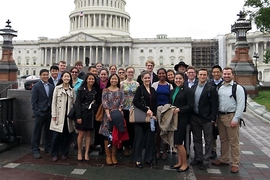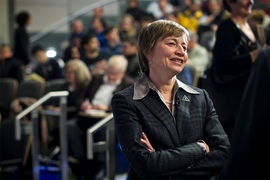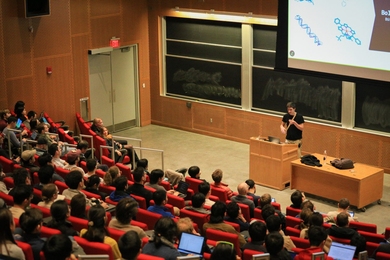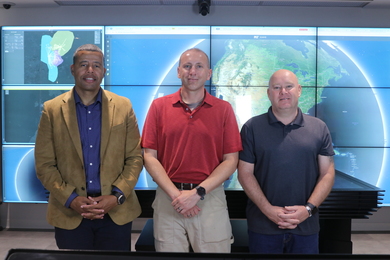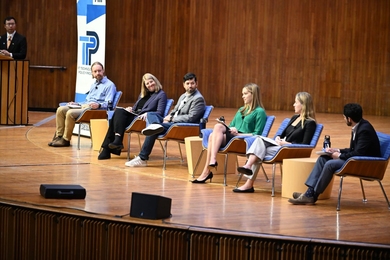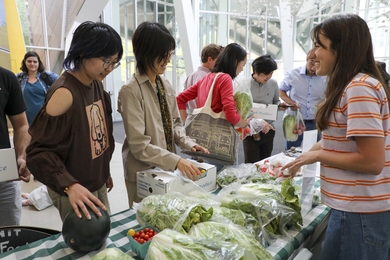On March 12-13, 27 MIT undergraduates and graduate students traveled to our nation's capital to participate in the annual Science-Engineering-Technology Congressional Visits Day (CVD). The Science Policy Initiative (SPI), a student group that recognizes the need for scientists’ involvement in policy formation, organized the trip. This was the 12th consecutive year that a delegation from MIT participated in CVD.
The students’ goal was to advocate for continued support for basic science and engineering research on Capitol Hill. The visit came on the heels of President Trump’s steep proposed budget cuts for research organizations in science and engineering, for the second consecutive year. In meetings with Democratic and Republican members, students shared personal experiences to illustrate the importance of continued support of research in Congress for their home districts and states, and for the nation as a whole.
The delegation met with 70 members of the Senate and House of Representatives, as well as their staff, representing 25 states in total. They came to Washington with a unified requested for a combined $58.9 billion in fiscal year 2019 budgets of the National Science Foundation, National Institute of Health, NASA Science, and the Department of Energy Office of Science, matching the requests of MIT. At the time of the March 13 meetings, Congress was still in the midst passing the budget for the 2018 fiscal year. With a vote expected at the end of the week, students had additional motivation to deliver their message and influence ongoing negotiations.
Shortly after the students departed from Capitol Hill, SPI and the greater MIT community was encouraged to see a direct impact of the CVD program. On March 15, during a House Science Committee hearing on the National Science Foundation, New York Representative Paul Tonko opened his statement by declaring, “We should not be flat funding education and we should not be flat funding research. Flat funding for almost a decade will means cuts to critical programs.” He went on to cite his meeting with CVD participant Erin Rousseau — a graduate student in the Harvard-MIT Program in Health Sciences and Technology — to give a human story to the sometimes abstract issue of federal science funding. Tonko stated, “We need more Erins who are going to be inspired to choose a STEM pathway and who will repay our nation’s commitment by moving science forward and changing the world.”
An agreement on an omnibus spending bill for fiscal year 2018 was reached on March 23, delivering a victory for science with the largest increases in federal research funding in more than a decade. These increases were secured largely because of a deal reached in February to raise budget caps on both defense and nondefense discretionary spending. “The boost in federal research spending provided by this bill is encouraging, but it is crucial that the scientific community continue to engage with lawmakers to ensure sustained support for science in 2019 and beyond,” said Jeremiah Collins, a graduate student in the Department of Nuclear Science and Engineering.
Congressional Visit Day is a means by which the Science and Policy Initiative trains and empowers students to become effective advocates for science policy. “Participating in CVD was a tremendous opportunity to engage with our representatives and learn about the legislative process — not just the technical procedures, but the interpersonal and practical activities that undergird most legislative progress,” said Max Olender, a graduate student in the Department of Mechanical Engineering. “I think this trip has given me a lot of experience and confidence. If I ever need to meet with anyone from the Senate or House again, I’ll know how to do so effectively,” said Briana Hiscox, a graduate student in the Department of Nuclear Science and Engineering.
With a combination of scientific expertise and firsthand experience imparted by CVD, the student participants are now uniquely prepared to continue working with policymakers to ensure government support for basic research that is central to the mission of MIT, as well as that of the wider science and engineering community.



